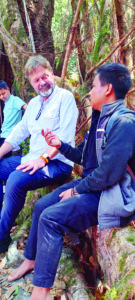By Our Special Correspondent

with locals during his visit to the living root bridges at Mawkyrnot village.
SHILLONG, March 25: German Ambassador to India and Bhutan, Dr Philipp Ackermann, who is on a three-day visit to Meghalaya, is enthralled by the natural beauty and diverse cultures. Dr Ackermann inaugurated the aqua park at Khliehshnong, created by GIZ in collaboration with the Meghalaya government on March 24. He is also attending the 7th Act East Business Show, which is running from March 25 to 27. What has fascinated him the most are the living root bridges at Mawkyrnot, which are cared for and maintained by clans and communities. In an exclusive interview with The Shillong Times, Dr Ackermann shares his views on Meghalaya and areas of future collaboration with the state.
ST: Dr Ackermann, what brings you to Meghalaya and what areas of cooperation do you see between Germany, North East India and Meghalaya in particular?
Ackermann: Well, as you know the GIZ – the German assistance foundation — has worked in India for over 60 years and one major accomplishment of GIZ in Meghalaya apart from what they have done in the past is the creation of the aqua park at Khliehshnong, Sohra, because it is one symbol of what we do in Meghalaya to preserve bio-diversity which is our commitment as a country. What was fascinating about the Aqua Park and museum is that the communities were deeply involved. Fisherwomen were present and excited about the project. The idea is to develop a practice of sustainable fishery.
ST: What do you see are the prospects for agro-ecology in Meghalaya since that is the key driver of sustainable agricultural practices?
Ackermann: The buzzword today is organic farming. Let me give the example of Uttar Pradesh where mango farmers have managed to shift their produce to retailers in European countries who are ready to pay for the transportation. Of course, the European Union has to certify the mangoes to be organic and that is possible through careful soil testing and getting out of the practice of over-fertilising and pesticides use. This is what agro-ecology and sustainable farming is all about.
ST: What is Germany bringing to the table at the Act East Business Summit?
Ackermann: Meghalaya is a small state but with immense opportunities, and a German delegation from Kolkata including the German Chamber of Commerce are looking at small and medium-sized businesses, particularly in the agricultural sector. We are aware that Meghalaya produces the best turmeric in the world and will look at opportunities in such businesses. It’s also true that the economy of scale cannot operate in the small hilly state hence businesses have to work around that.
ST: What are some of the lasting memories from this visit?
Ackermann: In the last two days, I visited the most beautiful places with verdant forests which are well looked after by communities and this is worth appreciating. My visit to Mawkyrnot and interaction with Morningstar Khongthaw, who leads the Living Root Bridge Foundation, and the community from the area including the clan elders was deeply enriching. Mawkyrnot is an example of sustainable tourism. To my mind, Meghalaya has immense potential for eco-tourism but perhaps it has to follow the Bhutan model and regulate the footfalls so that it does not degenerate into mass tourism. Tourists need to respect the living root bridges and not stomp over them with shoes on. I am told that the Double Decker Living Root Bridge at Nongriat is now over-exposed and has too many visitors. It is crucial to regulate the number of visitors per day for long-term sustainability of the root bridges.
The German government is assisting the Living Root Bridge Foundation and I am impressed by their ability to keep the forests around pristine. I love trekking and plan to trek with Morningstar Khongthaw on a six-hour-long journey.
ST: Your closing remarks on this first visit to Meghalaya
Ackermann: Meghalaya is a beautiful state of lush, green forests, undulating hills and valleys. It’s a blessed part of India. This is my first visit here and I am amazed at the diversity of India in terms of culture, food, language etc. India’s federal structure enables people to proudly promote their own identities and cultures. This is a huge advantage for India as people can be at home in their surroundings and just be themselves. I am amazed by the rich traditions and culinary. I enjoyed Khasi food very much. There are so many things to discover and wisdom to imbibe.
I will be travelling to Arunachal Pradesh after leaving here on March 26 and looking forward to that visit too.



